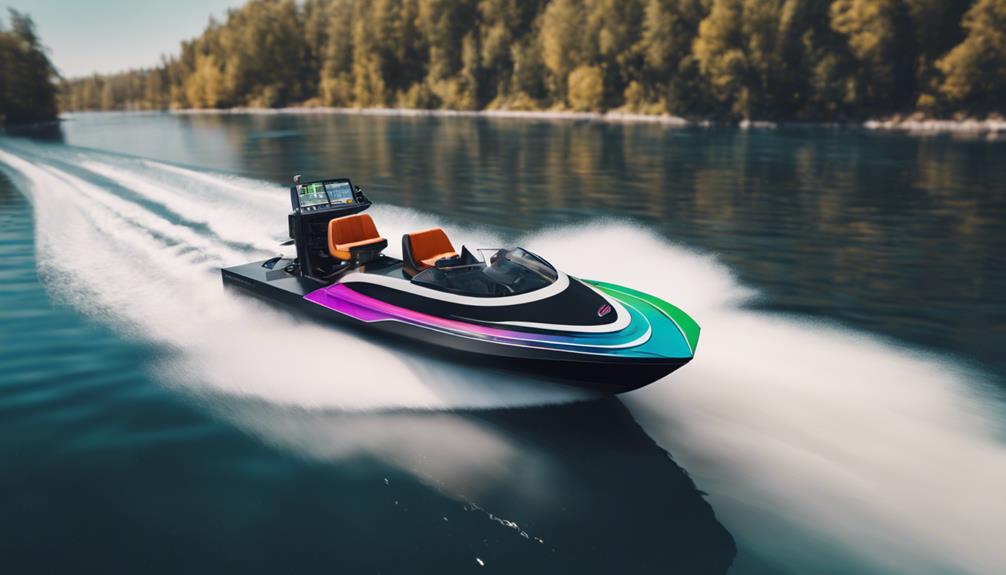A typical jet boat weighs around 3,000 lbs when you include the hull, engine, and trailer. Some lighter models can drop to about 2,000 lbs, while specific examples like the Spectra 20 reach 3,220 lbs. Factors that affect weight include engine size, hull material—fiberglass is common while carbon fiber is lighter—and trailer weight. Remember, the total weight also includes gear and fuel. Proper weight distribution is essential to prevent performance issues like instability. If you're curious about how different components influence jet boat weight, there's more to uncover.
Key Takeaways
- An average 18ft jet boat typically weighs around 3,000 lbs, including the boat, engine, hull, hardware, and trailer.
- Weight can vary significantly; lighter models may weigh as little as 2,000 lbs, while some can reach over 3,200 lbs.
- Engine type and size greatly influence overall weight; larger engines add more mass, impacting performance and handling.
- Hull materials also play a crucial role; fiberglass boats are heavier, while carbon fiber constructions can significantly reduce weight.
Average Weight of Jet Boats
Typically, an 18ft jet boat weighs around 3,000 lbs, including the boat, engine, hull, hardware, and trailer. This average weight can vary greatly based on several factors. For instance, some lighter jet boats might weigh as little as 2,000 lbs when you account for gear and equipment.
If you're comparing this to the average jet ski weight, which generally falls between 600 to 1,000 lbs, you can see that jet boats are considerably heavier.
When considering the overall weight of a jet boat, it's crucial to factor in not just the boat itself but also the engine and any additional features or modifications. Specific models, like the 1976 Hawaiian, might weigh around 2,990 lbs without fuel, while a Spectra 20 jet boat can tip the scales at 3,220 lbs.
The construction materials you choose, such as fiberglass or carbon fiber, also play a notable role in the weight. So, when you're planning a trip or considering towing options, remember that the overall weight, including fuel and equipment, can affect your towing vehicle and experience on the water.
Weight Breakdown Components
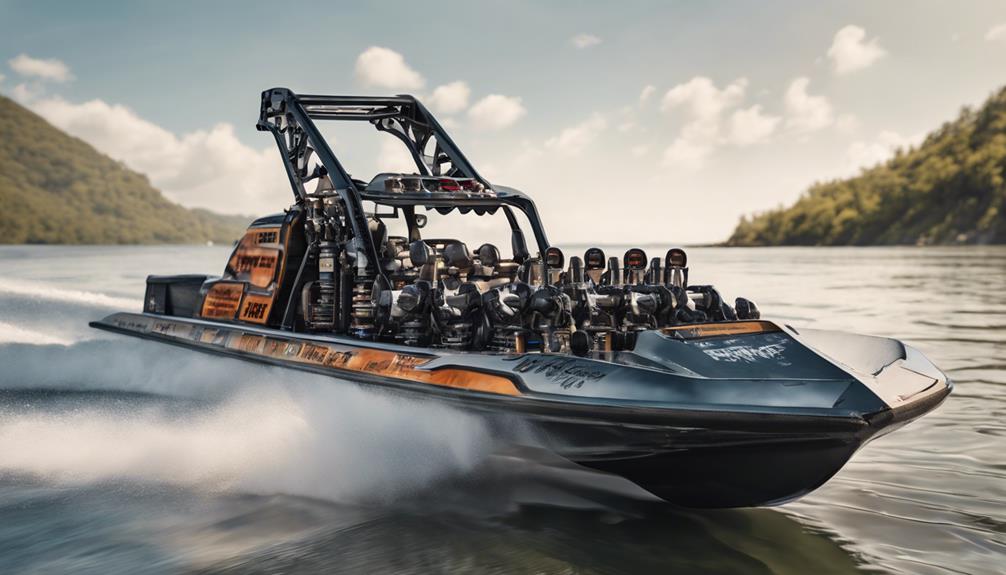
When you're looking at the weight of a jet boat, several key components come into play.
The engine type, hull materials, and trailer weight all greatly affect the total mass.
Understanding these factors helps you make informed decisions about your jet boat's performance and handling.
Engine Type Impact
The choice of engine type dramatically affects your jet boat's overall weight, as larger engines add significant mass while lighter materials can help keep it nimble. When selecting an engine, consider how big block engines can push your jet boat's weight up substantially, while smaller engines can help you stay under that 3,000 lbs mark typical for an 18ft jet boat.
Different engine configurations also play a role; for instance, naturally aspirated systems might weigh less than supercharged ones, impacting your boat's performance and balance. The materials used in engine construction are equally important. Opting for aluminum instead of cast iron can lead to a noticeable reduction in weight, enhancing your boat's agility on the water.
Don't overlook how the placement of the engine influences overall weight distribution and stability. A well-positioned engine can improve not just performance but also safety.
Ultimately, paying close attention to engine type and its weight implications will help you craft a jet boat that meets your performance needs while keeping it light and agile.
Hull Materials Comparison
Choosing the right hull material plays an essential role in determining your jet boat's weight and overall performance. When you're diving into a hull materials comparison, you'll typically find fiberglass and carbon fiber as the main contenders.
Fiberglass is the standard choice, known for its durability and lower cost, making it a popular option among many boaters. An 18ft jet boat made from fiberglass usually weighs around 3,000 lbs.
On the other hand, if you're looking for performance advantages, carbon fiber might catch your interest. While it comes at a higher price, it greatly reduces weight—possibly cutting the overall weight of your jet boat by nearly half. This weight savings can lead to better speed and improved fuel efficiency, making it an attractive option for performance enthusiasts.
However, keep in mind that the hull's design features, such as reinforcements and the deadrise angle, also impact weight and performance.
Trailer Weight Considerations
How much does the trailer contribute to your jet boat's overall towing weight? Understanding the weight of the trailer is vital. Depending on the type, jet ski trailers can weigh anywhere from 170 to 1,200 pounds. When you're planning your trip, you need to account for the trailer weight along with your jet boat and any gear.
Here's a quick breakdown of typical trailer weights:
| Trailer Type | Average Weight |
|---|---|
| Single Axle Jet Ski Trailer | 170 – 275 pounds |
| Dual Axle Jet Ski Trailer | 300 – 600 pounds |
| Multi-Jet Ski Trailer | Up to 1,200 pounds |
When calculating your total towing weight, be certain to check the manufacturer's specifications for your specific trailer. This guarantees you're within the towing capacity of your vehicle, which is essential for safe transport. Remember, overloading can lead to serious safety issues, so always consider the weight of the trailer in your calculations.
Examples of Jet Boat Weights
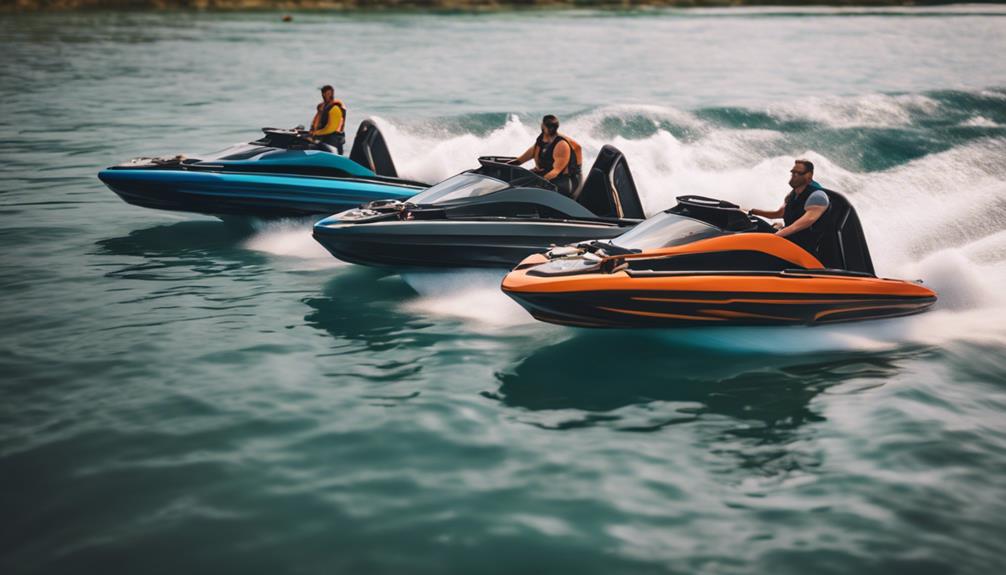
When you're looking at jet boat weights, you'll notice a wide range across different models.
For example, a classic 1976 Hawaiian model weighs about 2,990 lbs, while a 16ft CobraJet comes in at a lighter 1,600 lbs.
These variations highlight how modifications and specific features can impact a jet boat's overall weight.
Notable Jet Boat Models
Several notable jet boat models showcase a range of weights that reflect their design and features.
For instance, the classic 1976 Hawaiian model, with its big block engine and dual axle trailer, weighs approximately 2,990 lbs when not fueled. If you're looking for something a bit heavier, the Spectra 20 jet boat, also equipped with a big block motor and trailer, registers at 3,220 lbs.
On the lighter side, the 16ft CobraJet model stands out with a weight of around 1,600 lbs, making it a great choice for those who prefer a more nimble option. Meanwhile, the 18ft Avenger jet boat featuring a big block Ford engine on a single axle trailer weighs in at approximately 3,000 lbs.
These examples show how jet boats can vary considerably in weight based on their configurations and features.
Whether you prioritize speed, stability, or comfort, understanding the weight of these models can help you make an informed decision when choosing your perfect jet boat.
Weight Variations Explained
Weight variations in jet boats can considerably impact performance and usability, making it essential to understand how different factors contribute to their overall mass. For instance, engine type, size, and hull construction all play critical roles in determining a jet boat's weight. Here's a quick look at some examples of jet boat weights to illustrate these variations:
| Jet Boat Model | Total Weight (lbs) |
|---|---|
| 18ft Jet Boat | ~3,000 |
| 1976 Hawaiian Model | 2,990 (w/o fuel) |
| Spectra 20 | 3,220 |
| 16ft CobraJet | 1,600 |
| 18ft Avenger | 3,000 |
As you can see, even within a similar size range, the total weight can vary widely. For example, the 16ft CobraJet weighs considerably less than the Spectra 20, showcasing how design influences jet skis weight. Understanding these differences helps you make informed decisions when selecting a jet boat that fits your needs and preferences.
Impacts of Modifications
Modifications, whether it's upgrading the engine or adding new equipment, can greatly change a jet boat's overall weight and performance characteristics.
For instance, a 1976 Hawaiian jet boat with a big block Chevy (BBC) engine weighed 2,990 lbs without fuel. In contrast, a Spectra 20 jet boat with a similar BBC motor tipped the scales at 3,220 lbs. This shows how engine size directly influences weight.
When you consider an 18ft Avenger jet boat with a big block Ford (BBF) engine, the registered weight comes in at 3,000 lbs, again highlighting how the type of trailer affects overall weight. On the lighter side, a 16ft CobraJet weighs just 1,600 lbs, demonstrating that jet boats can vary greatly in weight.
These examples underscore the importance of considering modifications carefully. Each addition or change can lead to substantial weight variations, impacting your boat's performance and handling.
Weight Reduction Options
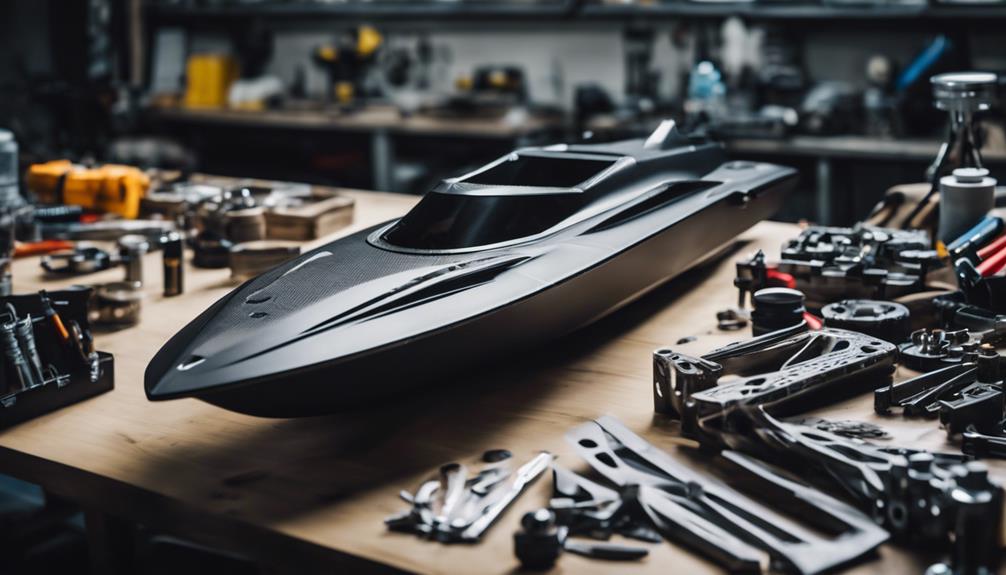
Exploring advanced materials like honeycomb and carbon fiber can dramatically lighten your jet boat, potentially slashing its weight by half. While these materials may come with a higher price tag, the benefits in performance and fuel efficiency can be well worth the investment. Custom designs tailored to your specific needs can further optimize weight reduction, guaranteeing your jet boat performs at its best.
You can also look into modifications for the engine. Choosing lighter engine types or optimizing existing components can lead to significant weight savings. Additionally, consider lighter trailers that can help reduce the total towing weight when combined with your jet boat.
Regular assessments and modifications of heavy components are essential. For instance, relocating fuel tanks towards the rear can improve weight distribution, enhancing performance and handling. These adjustments not only contribute to weight reduction but also create a more balanced ride on the water.
Considerations for Towing

When you've optimized your jet boat's weight, it's time to contemplate how to safely tow it to your favorite water destination. Start by calculating the total towing weight, which includes your jet boat, trailer, and all gear. This number is critical for guaranteeing your towing vehicle can handle the load. Make sure your vehicle's capacity meets or exceeds this total weight to avoid any risk of damage or losing control during transport.
Additionally, remember to factor in the weight of full fuel tanks and any other equipment, as these can greatly increase the total towing weight. You don't want to underestimate your load.
Before hitting the road, check local regulations regarding maximum trailer weight limits based on your towing vehicle's class. It's important to comply with these laws to guarantee a safe journey.
Proper weight distribution on the trailer is also crucial—imbalanced weight can lead to swaying and handling issues, compromising your safety on the road. By considering these factors, you can confidently tow your jet boat and enjoy a smooth trip to your next adventure.
Weight Distribution Considerations

Achieving ideal weight distribution in your jet boat is essential for enhancing performance and stability on the water. Proper placement of weight not only improves handling but also helps maintain control, especially at high speeds. You'll want to keep the majority of weight towards the rear of the boat to achieve that prime up attitude of 4-6 degrees.
Here are three key considerations for effective weight distribution:
- Rear Bias: Positioning weight towards the rear helps prevent bow digging during turns, which can impair maneuverability.
- Regular Assessments: Consistently check your weight placement to verify it's balanced. This helps avoid sluggish performance and bow steer, which can compromise your experience on the water.
- Equipment and Gear: Be mindful of the weight of any equipment or gear you bring aboard. Heavy items should be stored in a way that promotes an even distribution to maintain stability.
Performance Issues With Imbalanced Weight
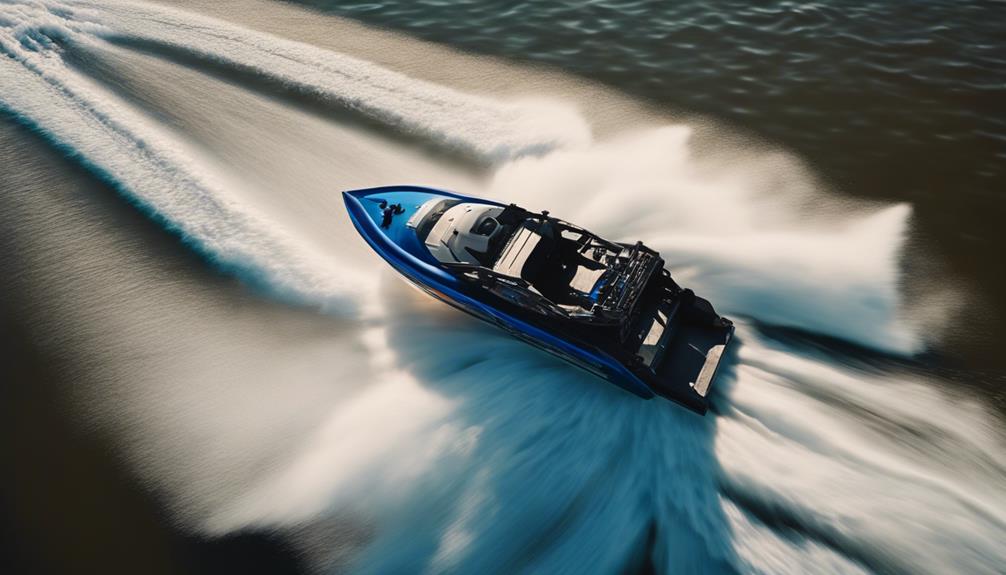
Imbalanced weight in your jet boat can seriously hinder performance, making it tough to reach optimal speed and handle turns effectively. When weight distribution isn't ideal, you may notice sluggish acceleration and difficulty maintaining control, especially during sharp turns.
Excessive weight at the bow can lead to bow steer, causing the boat to veer off course, which is especially problematic at high speeds. The risk of 180-degree spins increases with a front-heavy boat, leaving you feeling unstable and on edge. Even if you make engine trim adjustments, they mightn't fully counteract the bow-down issues caused by improper weight distribution. This can severely impact your overall ride quality and safety.
Maintaining proper hull contact with the water is essential; imbalanced weight can lift the bow, decreasing stability and heightening the chances of capsizing. To avoid these performance issues, regularly check your jet boat's weight distribution. By ensuring an even load, you'll not only enhance your boat's performance but also enjoy a smoother, safer ride on the water.
Frequently Asked Questions
How Much Does a 19 Foot Jet Boat Weigh?
A 19-foot jet boat typically weighs around 3,000 lbs, but variations exist. Depending on factors like engine size and construction materials, you might find lighter models closer to 2,000 lbs when fully equipped.
How Much Does a 21FT Jet Boat Weigh?
A 21ft jet boat typically weighs between 3,000 to 3,500 lbs. Remember, if you fill the fuel tank, you could add hundreds of pounds, so always check your vehicle's towing capacity for safety.
How Much Does a 20 Foot Boat Weigh?
A typical 20-foot boat weighs around 3,500 pounds, but this can vary based on design and materials. If you're considering one, check the specifications to find a model that fits your needs.
How Much Does a 25 Foot Boat Weigh?
Imagine the thrill of gliding across the water. A typical 25-foot boat weighs between 4,000 to 6,000 pounds, factoring in its construction, engine, and equipment, so keep that in mind when planning your adventure.
What Are the Different Factors that Contribute to the Weight of Jet Boats?
When it comes to sea doo jet boat weight facts, there are several factors that contribute to the overall weight of these watercraft. The materials used in construction, the size of the engine, the additional features and amenities, and the fuel and water storage capacity all play a role in determining the weight of jet boats.
Conclusion
In the world of jet boats, understanding weight is like steering a winding river—essential for a smooth ride.
By knowing the average weight and how components stack up, you can keep your boat balanced and ready for adventure.
Whether you're shedding pounds for performance or considering what to tow, remember that a well-balanced vessel glides through water like a dancer, effortlessly cutting through waves.
So, weigh your options and set sail with confidence!

